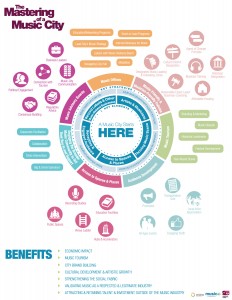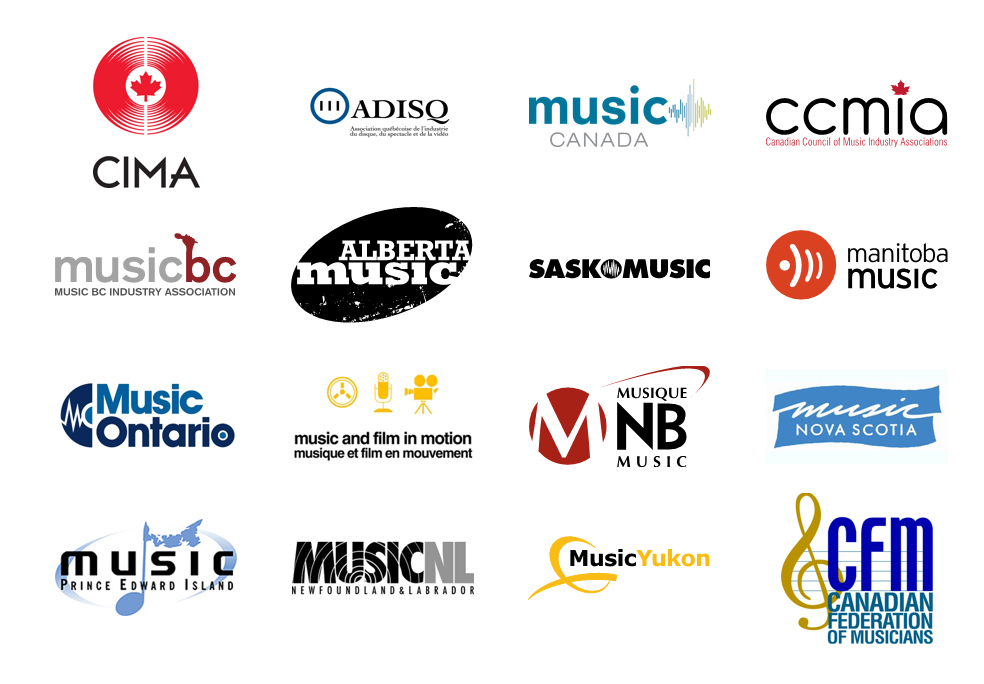Cannes, France, June 5, 2015: Recording industry groups IFPI and Music Canada have today released a new report that sets out how cities worldwide can take simple steps to help develop their music economies.
The Mastering of a Music City was launched at Midem, the world’s largest music industry conference.
The report provides a simple checklist to help local authorities, businesses, community groups and the creative sector capitalise on the potential of music to build, grow and strengthen their cities.
It cites examples from 22 cities from all continents to explain what a music city is, why it is beneficial, and – critically – the most effective strategies and policies that can be implemented to nurture active music hubs.
Graham Henderson, President and CEO, Music Canada, says: “A vibrant music sector delivers an extensive array of social, cultural and economic benefits to its community; from job creation and retention to city identity and music tourism, to social cohesion, music can play an essential role.”
“Communities of any size, anywhere in the world, can assess the extent to which they have the essential ingredients for a Music City, and deploy the strategies successfully used in the likes of Nashville, Melbourne, Toronto, Berlin and other renowned Music Cities, in order to enhance or grow theirs. These strategies don’t necessarily require heavy investment – addressing red tape and establishing dialogue between leaders in the music community and city officials are inexpensive ways to grow music’s contributions.”
The Mastering of a Music City has identified recommendations in seven strategic areas that are an effective means to grow and strengthen a city’s music economy:
- Music and musician-friendly policies, from licensing and liquor laws to parking and planning regulations to affordable housing and artist entrepreneur training.
- The creation of Music Offices to help musicians and music businesses navigate the broad range of government policies and regulations that impact music.
- The formulation of Music Advisory Boards to engage the broader music community in a collaborative way and to facilitate dialogue with city governments.
- Engaging the broader music community to ensure the people most affected by music policies are involved and informed.
- Access to spaces and places for artists to practice, record, and perform at every stage of their career.
- A focus on audience development, ensuring that there is an engaged and passionate audience for local musicians as well as international touring artists, now and into the future.
- Music tourism or the development of a Music City brand to leverage a thriving live music scene, rich music history, or large music festivals in order to reap the significant benefits associated with music.
In addition, multi-level government support for music, a broader city infrastructure conducive to the sector, music education programmes and efforts to highlight music history and identity are important.
Frances Moore, Chief Executive, IFPI, comments: “We’re delighted to be a partner in the Music Cities project, and we will work with our affiliates in 57 countries to spread the good work that Music Canada has been doing elsewhere in the world. They will be taking this report into City Halls worldwide, recognising that each place has different needs and priorities, but urging leaders to seize the common advantages offered by a growing music economy.
“We realise this will benefit the recording industry too, and that is the other reason we are co-sponsoring the report. Our job at IFPI is to improve the environment in which our member companies operate and this is one way that we can do that. Just imagine a world where you can go from country to country and find music cities in every one. That would be good for artists, good for record companies, good for city leaders and good for the wider public that just wants to enjoy great music.”
The Mastering of a Music City was produced after more than 40 interviews with music leaders, city and tourism officials, international focus groups and secondary research. It cites best practices and case studies from 22 cities. IFPI’s affiliated national groups will share the report globally to assist municipal leaders and other stakeholders to develop local music strategies.
Download Report
About IFPI:
IFPI is the organisation that promotes the interests of the international recording industry worldwide. Its membership comprises some 1,300 major and independent companies in 62 countries. It also has affiliated industry groups in 57 countries. IFPI’s mission is to promote the value of recorded music, campaign for record producer rights and expand the commercial uses of recorded music in all markets where its members operate.
About Music Canada:
Music Canada is a non-profit trade organization that represents the major record companies in Canada, namely Sony Music Entertainment Canada, Universal Music Canada and Warner Music Canada. Music Canada also works with some of the leading independent record labels and distributors, recording studios, live music venues, concert promoters, managers and artists in the promotion and development of the music cluster.
For more information, contact:







Music Canada